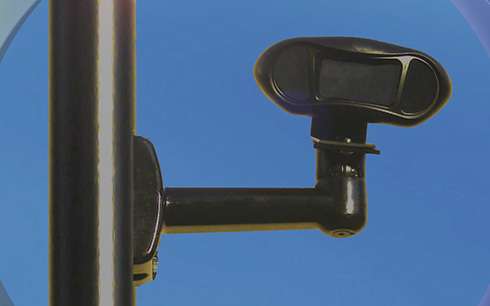License-Plate Cameras Are Part of the Domestic Surveillance You Didn't Know About

As noted at Reason 24/7, license-plate scanners are back on the national radar at a moment when Americans are belatedly awakening to the surveillance state that has quietly developed around them. The Center for Independent Reporting discusses the shock a computer security consultant felt when he discovered that the single camera-equipped car in San Leandro, California, "had logged his car once a week on average, photographing his license plate and documenting the time and location." Even worse, police departments in northern California are sharing the data they collect. building a record of people's movements. But the problem isn't a local or regional one — cameras capable of capturing and processing license plate numbers are proliferating nationally, and we're well on the way to a unified system, partially planned and largely ad hoc, that monitors the comings and goings of motorists around the country.
From the Center for Independent Reporting:
When the city of San Leandro, Calif., purchased a license-plate reader for its police department in 2008, computer security consultant Michael Katz-Lacabe asked the city for a record of every time the scanners had photographed his car.
The results shocked him.
The paperback-size device, installed on the outside of police cars, can log thousands of license plates in an eight-hour patrol shift. Katz-Lacabe said it had photographed his two cars on 112 occasions, including one image from 2009 that shows him and his daughters stepping out of his Toyota Prius in their driveway. …
A year ago, the Northern California Regional Intelligence Center – one of dozens of law enforcement intelligence-sharing centers set up after the terrorist attacks of Sept. 11, 2001 – signed a $340,000 agreement with the Silicon Valley firm Palantir to construct a database of license-plate records flowing in from police using the devices across 14 counties, documents and interviews show.
The extent of the center's data collection has never been revealed. Neither has the involvement of Palantir, a Silicon Valley firm with extensive ties to the Pentagon and intelligence agencies. The CIA's venture capital fund, In-Q-Tel, has invested $2 million in the firm.
Yes, that's disturbing, but we've been on-track to this point for a while. Tiburon, California, photographs the license plate of every car that transits the two roads into town. Police there know when you're coming and going.
And forget San Leandro's single license plate camera, or even Tiburon's monitored chokepoints; the Washington Post reported in 2011 that Washington, D.C. had 250 such cameras deployed.
The DEA has been working by itself and with law-enforcement agencies throughout the southwestern United States to install fixed-location license plate scanners along interstate highways with the stated goal of picking up patterns of movement that may lead to drug smugglers. Of course, to detect pattens, you need to store data, which means building a database recording the passage of vehicles along those highways.
But law-enforcement agencies don't need to create such databases from scratch to record and share information on our movements if they don't want to. They can just plug into the system already established by Vigilant Solutions, which boasts that its National Vehicle Location Service "aggregates between 35-50 million LPR records every month, and is the largest LPR data sharing initiative in the United States."
The quiet but rapid growth in use of license-plate readers is due to the enthusiasm that law enforcement has for the technology. The International Association of Chiefs of Police even adopted a resolution that "strongly encourages the U.S. Congress to fully fund license plate reader and related digital photographing systems, including interrelated information sharing networks, for the northern and southern borders of the United States" and urges other countries to adopt compatible technology to ease data sharing.
That the CIA is investing in Palantir shows that interest in tracking our movements extends beyond law enforcement agencies and into the intelligence community. The surveillance state is better established than most people realize, and reaches far beyond our communications and Internet activities.
Here's me discussing license-plate cameras on RT, last year:


Show Comments (73)